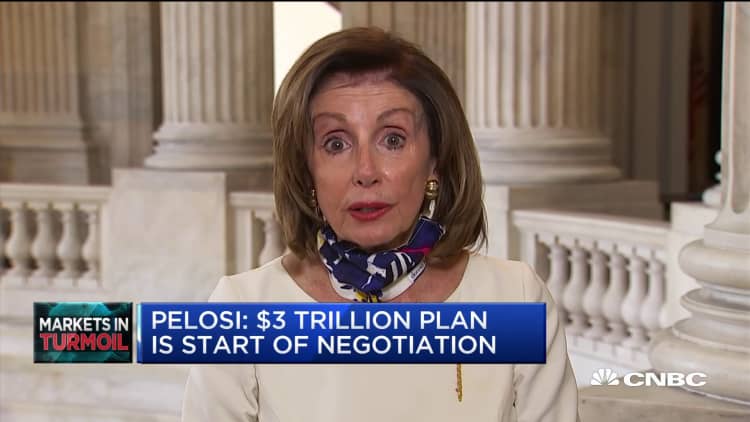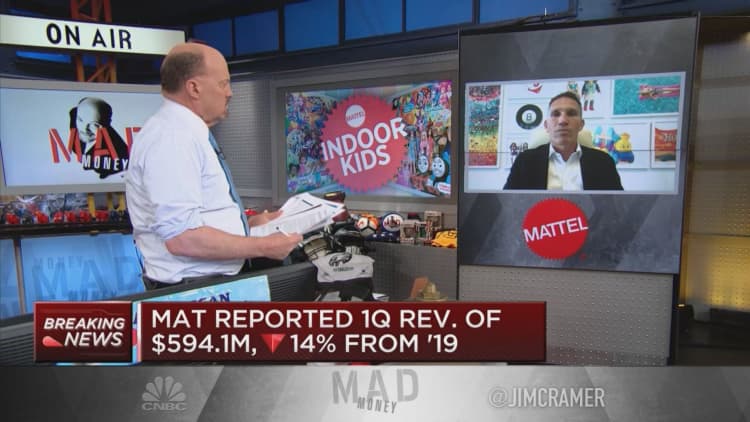Anyone listening to congressional leaders speak during the coronavirus outbreak has heard a lot about the "heroes" sustaining the rest of the country.
Senate Majority Leader Mitch McConnell, R-Ky., on Tuesday lionized "American heroes" in the health-care industry whom he said should have stronger protections from lawsuits. About a month earlier, Senate Democrats proposed a "Heroes Fund" to give a $13 an hour hazard pay raise to workers — from doctors and nurses to grocery and transit employees — who face a heightened risk of contracting Covid-19, the deadly disease caused by the coronavirus.
House Democrats, who hold the majority in the chamber, also used the term "heroes" on Tuesday, calling their next $3 trillion relief bill the "HEROES Act." The proposal, which could pass in the Democratic-controlled House but has little chance of getting through the GOP-held Senate and becoming law, includes a $200 billion "Heroes Fund" to offer front-line employees a raise.
Two months into the pandemic, only some businesses and cities have given the people still required to go into work a raise. While lawmakers have put forward several hazard pay plans, none of them made the cut in the four bills Congress has passed to try to mitigate the coronavirus's devastation.

As workers deemed essential "heroes" during the pandemic push for better compensation, no legislation with a real chance of becoming law has yet included better pay for them. As Republicans pump the brakes on another major federal spending bill, passage of a widespread wage hike for front-line workers appears unlikely in the coming weeks.
"They're putting their lives on the line, they're essential employees. They should be compensated for that. This is above and beyond the normal call of duty," said Bob Gibson, vice president of Service Employees International Union Local 1199 in Florida, a state where the union represents more than 25,000 health-care employees.
Minimum wage and small pay bumps
Among the millions of Americans who face a higher risk of getting sick or passing Covid-19 to their families by going into work, many still make less than $15 per hour – the standard labor rights groups have adopted as a "living wage" even under safer conditions. For example, Gibson said certified nursing assistants and patient care technicians make roughly between $9 and $13 an hour in Florida, depending on where they work.
The Wall Street Journal reported this month that 1 in 4 companies where employees have to work on-site are extending hazard pay, citing an April survey from WorldatWork.
Some major employers have offered essential workers raises during the pandemic: Target and Amazon at least temporarily boosted wages for front-line employees by $2 per hour. So did Kroger, though it plans to end the pay hike on May 17. Others such as Walmart gave workers one-time bonuses of $150 or more.
In Florida, Gibson said some health-care employers have increased wages, though getting a raise can depend on how much contact a worker has with Covid-19 patients.
Labor unions around the country have called the compensation increases inadequate relative to the risk workers face.
The push for bigger raises
Federal hazard pay proposals have gained traction as the crisis drags on, though most of the support has come from the Democratic side. Last month, Senate Democrats outlined a plan for a $13 per hour raise for essential workers from the date the U.S. declared a public health emergency in late January through the end of the year. The proposal includes a $15,000 incentive to recruit health- and home-care workers and first responders.
Sen. Mitt Romney's proposal this month from the Republican side shows the differences the parties would have to resolve to approve a hazard pay plan. While the Utah Republican's plan would hike wages by a similar amount, $12 an hour, it would only take effect for May, June and July. Employers would fund one-quarter of the raises, while the federal government would cover the remaining three-quarters through a refundable tax credit.

Molly Kinder, who has studied and written about hazard pay at the Brookings Institution, said the duration of the wage hikes and how much of the cost companies cover could emerge as sticking points if lawmakers move forward with bipartisan talks. She noted that while certain larger companies appear better equipped to handle a share of the wage increases, other employers could find it harder to cover the costs.
But she said she saw significant overlap in the plans from Democrats and Romney that would help to address "inequality and the burden we're asking the lowest wage workers to carry."
"I do actually see a lot of common ground. I think there's a lot of room for moving forward," said Kinder, a David M. Rubenstein fellow at Brookings.
It remains to be seen whether appetite for a law to hike wages for essential workers increases among Republican congressional leaders. A spokesman for McConnell declined to comment on whether the Kentucky Republican supports a hazard pay hike.
Labor groups will continue to push Congress for a range of protections, from hazard pay to better sick leave benefits and health coverage. The fact that lawmakers continue to lionize "heroes" but have not passed a pay increase grates on Gibson of the SEIU.
"It's time to put your money where your mouth is," he said.


